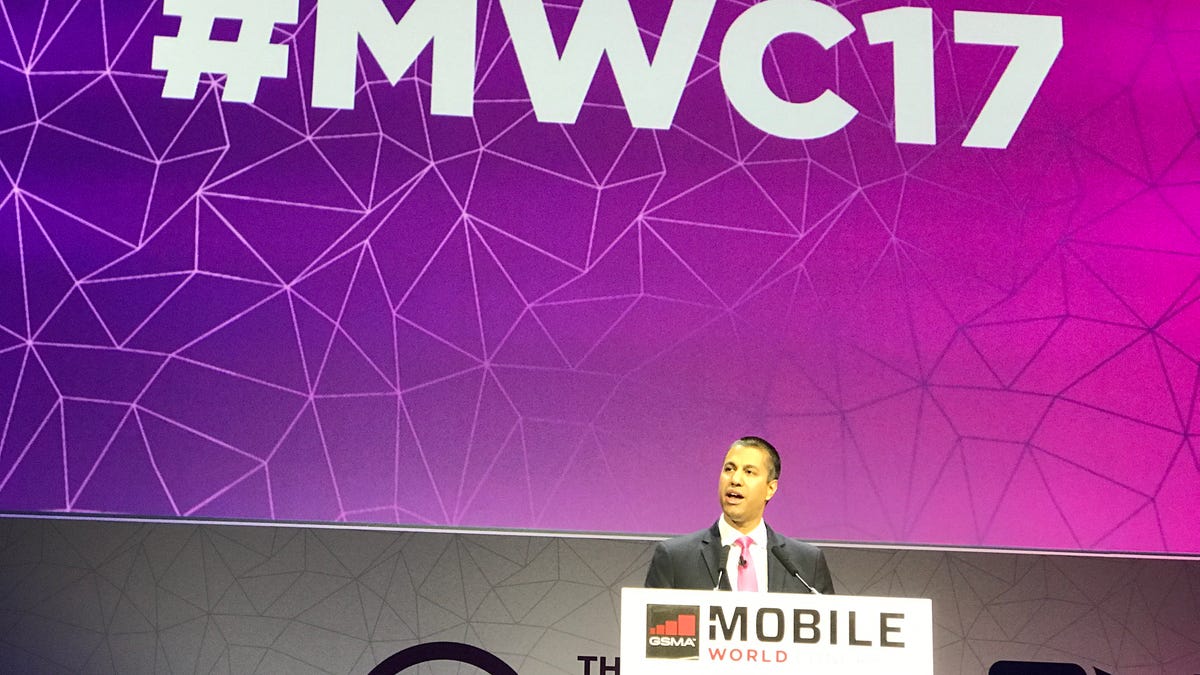New FCC head: I want to bring faster, cheaper broadband to all
The newly christened head of the Federal Communications Commission outlines his vision for light-touch regulation that he believes will spur investment in future networks.

FCC Chairman Ajit Pai pushes for less regulations.
Ajit Pai wants to make it clear: There's a new chairman in town.
The newly christened chairman of the Federal Communications Commission likely won over the telecom-centric audience at a keynote session during the Mobile World Congress trade show on Tuesday. In his prepared remarks, Pai laid out a vision of light-touch regulation and reversing the policies of his predecessor, Tom Wheeler.
"It's evident the rules were a mistake," Pai said, referring to the utility-style regulations that Wheeler helped put in place. "It created uncertainty in the market, and uncertainty is the enemy of growth."
Pai is widely expected to dismantle the rules governing net neutrality -- the principle that calls for the equal treatment of internet traffic -- by removing those utility style rules. He believes that those rules are overly onerous and a lighter regulatory approach will spur investment in future networks. Internet companies and consumer advocacy groups argue those rules are in place to keep phone and cable companies from squashing competition and raising prices.
"Here's how cost-benefit analysis works in the Trump administration and at the Pai FCC: If any favored lobby like the cable industry claims that rules cost them money, the agency will zap those rules -- without any regard for their benefits," said Matt Wood, policy director at advocacy group Free Press.
Pai, however, said he would preserve a free and open internet. He argued that the rules put in place two years ago actually reduced the level of broadband investment, a slowdown he's looking to avoid. "Remember, networks don't have to be built," he said. "The more difficult the government makes it to deploy investment, the less likely that broadband providers will take the risk."
FCC and 5G
The move to 5G networks has been a big trend at the show this year. Pai notes that investment will be expensive, from the need to acquire more spectrum to the roll out of millions of cell sites and miles of additional fiber-optic lines.
"The key to realize our 5G future is to set rules that maximize investment in broadband," he said.
Pai argued that the rules set two years ago didn't solve any problem. "We were not living in a digital dystopia," he said.
Pai has already ended an FCC investigation into zero-rating -- the concept that carriers can selectively offer service without it eating into your data plan. Consumer advocates say this violates net neutrality because it lets the carriers choose winners and losers by selectively offering zero rating. Pai disagrees.
"America's approach to broadband policy will be practical, not ideological," he said.
Where politics play
Pai was grilled by a moderator about how he would do his job given the highly political environment in the US, with President Donald Trump vowing to reject the AT&T-Time Warner deal and SoftBank CEO Masayoshi Son cozying up to Trump for a possible Sprint-T-Mobile deal (SoftBank owns a majority share in Sprint).
Pai said he takes a limited view of his job as an independent regulator protecting the interest of the public. "These are business and political issues that are above my pay grade," he said, eliciting a chuckle from the audience.
The approach he wants to take is the same one used during the time between President Bill Clinton and President Obama's first term, but a shake-up from the last four years.
"Today, the torch has been passed to a new generation," he said.

